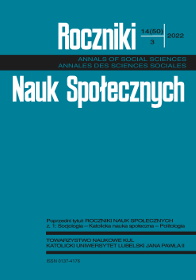MODELE FUNKCJONOWANIA OSÓB STARSZYCH W TYM NIESAMODZIELNYCH W RODZINIE
MODELS OF FUNCTIONING IN THE FAMILY FOR OLDER PEOPLE, INCLUDING DEPENDANTS
Author(s): Monika Dorota AdamczykSubject(s): Family and social welfare, Gerontology, Welfare services, Social Norms / Social Control
Published by: Towarzystwo Naukowe KUL & Katolicki Uniwersytet Lubelski Jana Pawła II
Keywords: older people; ways in which older people function within the family; models of care for dependent older people; dependency;
Summary/Abstract: The purpose of the article is to demonstrate the ways in which an elderly person functions within a family, with particular emphasis on the aspect of taking care of them and their potential within the family. The research problem that has been tackled here is contained in the fol- lowing questions: What is the meaning of family in the life of the elderly? What role do the elderly play in the family? How are the elderly taken care of, depending on the adopted model of providing care, in the case of their dependence? What form of life organisation in old age is optimal – should the elderly live with the younger generation or maintain their own independent household? The article uses the analytical-synthetic method on the basis of selected subject literature.Conclusions: The observed disappearance of multigenerational families, as well as the lowered quality of intergenerational relations, resulted in the elderly being pushed to the margin of not only social, but often family life. In the case where an elderly person is not independent, the form of care is becoming more and more institutional, which is contributed to by socio-cultural conditions. However, both for the elderly and their families, the most optimal way of functioning is living to- gether or in a distance that allows for frequent direct contact.
Journal: Roczniki Nauk Społecznych
- Issue Year: 50/2022
- Issue No: 3
- Page Range: 189-208
- Page Count: 20
- Language: Polish

